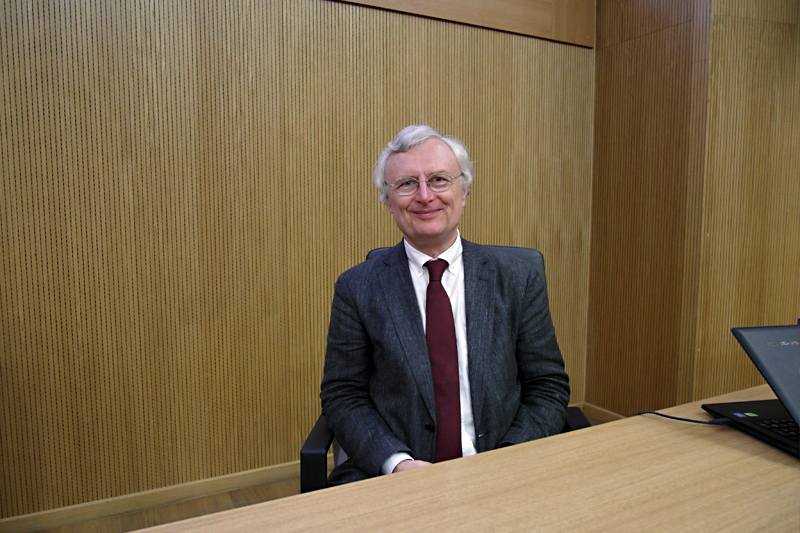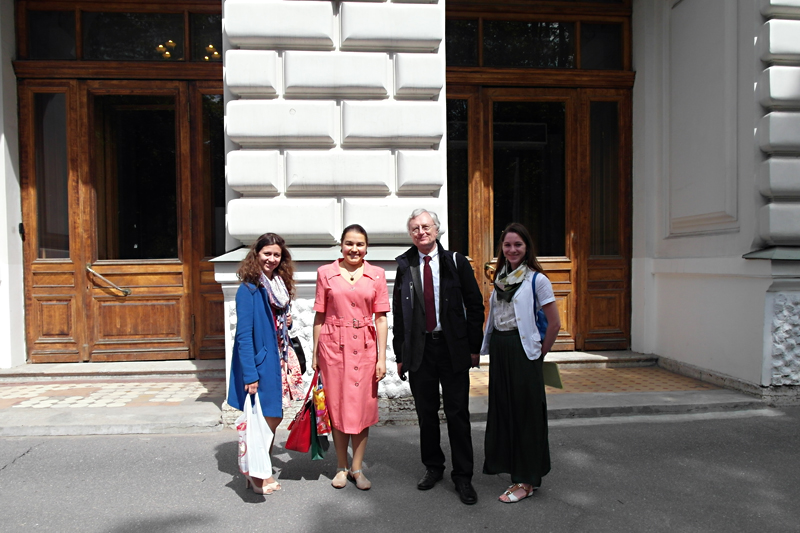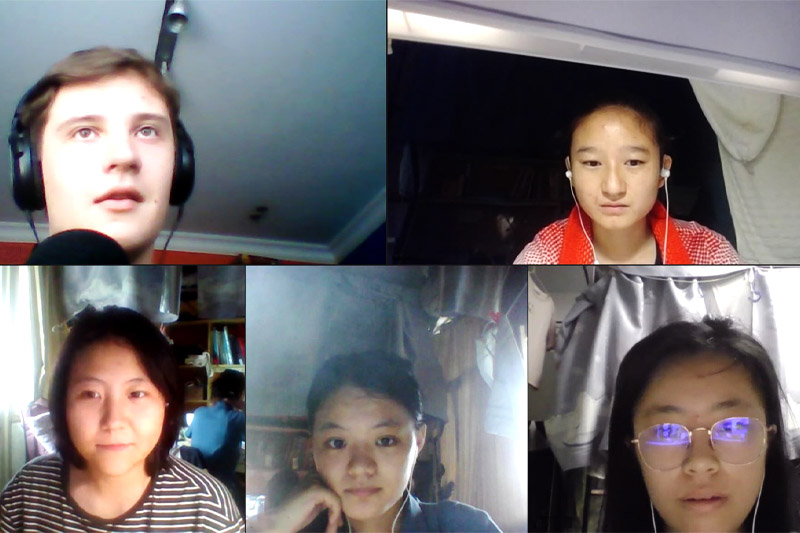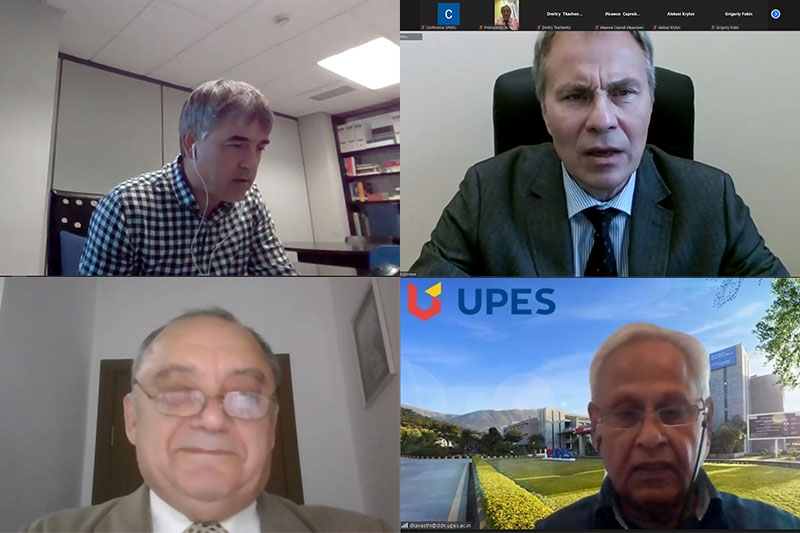
At the end of June Director of Institute of Experimental Physics (Graz University of Technology, Austria) professor Wolfgang E. Ernst gave a lecture 'Molecular Dynamics and Cluster Formation in Superfluid Helium Droplets' for SPbPU students. Then we interviewed Professor Ernst and he told us about his scholarly endeavor, efficient teaching approaches, gave an opinion about the trends of the modern higher educational system and also entrusted with a secret about self-motivation and why it is important to motivate students to study.
- Is this your first visit to St. Petersburg?
- Yes, it's my first visit. St. Petersburg is one of the most beautiful cities in the world. This combination of water, and architecture, and then the sun of sunlight... It is just gorgeous! I think I took more than a hundred pictures. I'll definitely come back!
- Here at SPbPU you gave a lecture ‘Molecular Dynamics and Cluster Formation in Superfluid Helium Droplets’ for our students. Could you explain our readers in simple words what your lecture is about?
– There is now interest at first in basic research, but then it will go into technology to explore more and more very small fractions of material which you build up from an individual atom. So you put together atom by atom, and then you try to see, if it has properties that are different from what you are used to have in everyday life. 'Properties' I mean like electric properties, magnetic properties, etc. And this is an area where you have a chance from materials which are not very expensive build new samples which can perhaps replace something which is expensive to handle.

For example, in Chemistry when you use catalyzers to do catalytic reaction, then it is nowadays still done with very expensive materials, with platinum, palladium or so on. And if you can find replacements by building new structures from cheaper type, then this would be an economic advantage, so anyway in the long term basic research will hopefully turn into economic advantage.
- You told us about everyday life. And are there any examples of practical use of these researches in everyday life?
- For example, petroleum industry. Catalytic reactions which I've already mentioned are an essential part of petroleum processing. Normally the materials used for these catalytic processes are that expensive, so researchers try to look into cheaper ones. One of my former students was involved in a project which is around the same topics which I talked about. It was funded by a big petroleum industry, it was a grant given to a university by British Petroleum (BP), and he explored theoretically how more efficient a platinum converter could be if it's all set up by small, very small platinum clusters.
- Speaking about students, how long have you been working as a professor?
- More than 34 years. During this time I worked in West Berlin, then in 1990 I got the position in the USA, so I had worked there for 12 years at the Pennsylvania State University; and then in 2002 I have started working at Graz University of Technology. Here I had 16 students who finished PhD with me, and this is the largest group of doctoral students I've ever had. Right now I have 5 students working on the PhD with me.
- What teaching approaches do you consider to be the most efficient?
- Well, it depends, of course, on the year during the education. I prefer working with small groups of students, but in the very beginning of a bachelor’s program it is almost impossible. But then in the master’s program I can work with 15 students in the class, and that is better, especially when they start working on their master theses. Then we have everyday contacts. My office door is always open. This is the thing I've learnt in the USA. It is good when professors can easily be approached, so students come to the open door, knock and then you talk with them.

- What do you think, what is an appropriate amount of students in a group?
- This is an important question. Now I have 2 young assistant professors that are still working with me, and so together we are 18, which is getting a bit large. So I would agree with one famous Noble prize winner at Stanford whom I talked to many years ago. He said: 'Nine students in my group – this is what I can handle well', and I fully agree. Something below ten, so you can have really intensive contacts. When one of them comes with a question, you can spend an hour on talking. When it's more, then it becomes more difficult. Once a week on Fridays we have a big meeting, and everyone tells what he has done during the week. When the problems come up, then the others hear that – if they have not heard that before – and then they can help each other. It's a very good experience.
- And what do you think, what are the modern trends in the higher education?
- I think this is still something which has not been really resolved. There is the constant evaluation of programs, and according to the international statistics, now many people in each group have an academic education. And now the question is: should everybody have an academic education? There can be different opinions, because we have a tendency to raise that portion, but partly it is caused by the quality of the education, because more and more students are there, and you cannot interact with them, so you just try to push them through the system. And I am not sure if that is a good development. In many countries we observe that very few people know one of the traditional professions – craftsmanship or so. And I have probably bigger sympathy to somebody who is an excellent craftsman rather than being a bad scientist. Unfortunately, there is no yet a clear solution now.
- Maybe you can find any positive trends?
- Sure. It’s about the technologies especially when it comes to interface with computers and analyzing data... All this requires more people knowledgeable in this area. So this is something which we probably achieve in a better way than in former times, and of course that has to continue.
- And what about e-learning?
- It requires a lot of discipline on the side of the people who learn. I observe that with all the Internet materials which are there on my course, people do think that they don't have to come to the lecture. And the problem is that a week before their exam they start to learn and this is too short. Pure e-learning is not being a success. It is an addition, that can be complimentary, but at least at the higher level you need personal interaction. It can work only when a student is able to organize his or her time in such a matter to spend some hours a day on his or her studying.
- Do you think the professors should motivate the students to study?
- Of course they should. You have to ask interesting questions, you have to relate with examples from everyday life. There are really few who are self-motivated. This has always been in history. Students, maybe one in a million, learnt through the encyclopedias, and did all in their own. But this is not a normal case. I think, my parents motivated me even before school, and I think it has to continue through all your life. Even we, professors, should be motivated sometimes!
- What can you advice our students to be motivated?
- First of all, the matter which you study yourself. This is partly the self-motivation, because you want to know more deeply what is behind, what is around you. So in science (and nature science especially) when you see something happening, you start to think 'why is it happening?' It can be compared with a small kid who is about to learn speaking. He moves around in the room and explores things, then there is a desire to explore the environment. Then, of course, one other thing is to shift the borderlines how far your understanding goes, so that you keep ask questions and not stop when you'll have got the explanations. This is what drives you ahead. You've got some explanations, but you realize this is not deep enough, because it does not connected to other explanations perhaps. So this is all where you can get your motivation from.
– Professor Ernst, thank you very much for the interesting interview! We wish you good luck in your pedagogical and scholarly endeavors!



